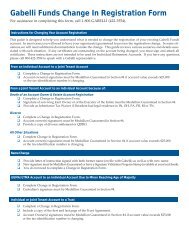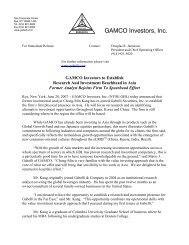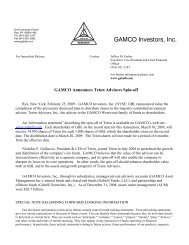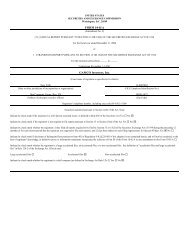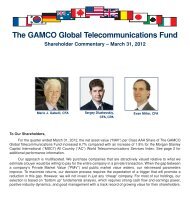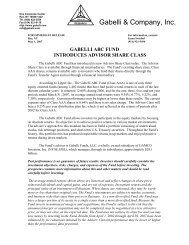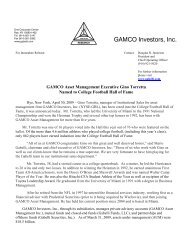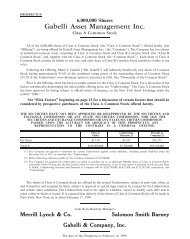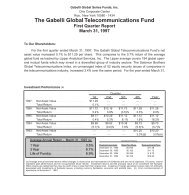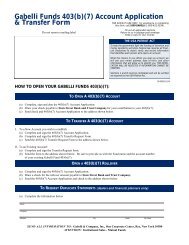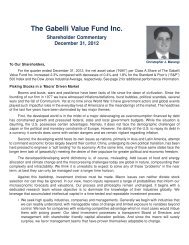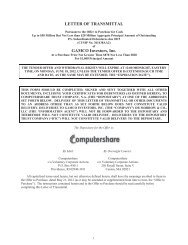Statement of Additional Info - Gabelli
Statement of Additional Info - Gabelli
Statement of Additional Info - Gabelli
You also want an ePaper? Increase the reach of your titles
YUMPU automatically turns print PDFs into web optimized ePapers that Google loves.
nevertheless, would be taxable to the shareholder as ordinary income or capital gain as described above, even though,<br />
from an economic or investment standpoint, it may constitute a partial return <strong>of</strong> capital.<br />
The Funds may invest in stocks <strong>of</strong> foreign companies that are classified under the Code as passive foreign investment<br />
companies ("PFICs"). In general, a foreign company is classified as a PFIC under the Code if at least one-half <strong>of</strong> its<br />
assets constitutes investment-type assets or 75% or more <strong>of</strong> its gross income is investment-type income. Under the PFIC<br />
rules, distribution <strong>of</strong> accumulated earnings or gain from the sale <strong>of</strong> stock <strong>of</strong> the PFIC (referred to as an "excess<br />
distribution") received with respect to PFIC stock is treated as having been realized ratably over the period during which<br />
the Fund held the PFIC stock.<br />
A Fund itself will be subject to tax on the portion, if any, <strong>of</strong> the excess distribution that is allocated to the Fund's holding<br />
period in prior taxable years (and an interest factor will be added to the tax, as if the tax had actually been payable in such<br />
prior taxable years) even though the Fund distributes the corresponding income to shareholders. All excess distributions<br />
are taxable as ordinary income.<br />
A Fund may be able to elect alternative tax treatment with respect to the PFIC stock it holds. One election that is<br />
currently available, provided the appropriate information is received from the PFIC, requires a Fund to generally include<br />
in its gross income its share <strong>of</strong> the earnings <strong>of</strong> a PFIC on a current basis, regardless <strong>of</strong> whether any distributions are<br />
received from the PFIC. If this election is made, the special rules, discussed above, relating to the taxation <strong>of</strong> excess<br />
distributions, would not apply. In addition, other elections may become available that would affect the tax treatment <strong>of</strong><br />
PFIC stock held by a Fund. Each Fund's intention to qualify annually as a regulated investment company may limit its<br />
elections with respect to PFIC stock.<br />
Because the application <strong>of</strong> the PFIC rules may affect, among other things, the character <strong>of</strong> gains, the amount <strong>of</strong> gain or<br />
loss, and the timing <strong>of</strong> the recognition <strong>of</strong> income and loss with respect to PFIC stock, as well as subject a Fund itself to<br />
tax on certain income from PFIC stock, the amount that must be distributed to shareholders by a Fund that holds PFIC<br />
stock, which will be taxed to shareholders as ordinary income or long term capital gain, may be increased or decreased<br />
substantially as compared to a fund that did not invest in PFIC stock. Investors should consult their own tax advisors in<br />
this regard.<br />
Dividends and interest paid by foreign issuers may be subject to withholding and other foreign taxes, which may decrease<br />
the net return on foreign investments as compared to dividends and interest paid by domestic issuers. The Funds do not<br />
expect that they will qualify to elect to pass through to its shareholders the right to take a foreign tax credit for foreign<br />
taxes withheld from dividends and interest payments.<br />
The Funds will be required to report to the Internal Revenue Service all distributions <strong>of</strong> taxable income and capital gains<br />
as well as gross proceeds from the redemption or exchange <strong>of</strong> Fund shares, except in the case <strong>of</strong> exempt shareholders,<br />
which include most corporations. Under the backup withholding provisions, distributions <strong>of</strong> taxable income and capital<br />
gains and proceeds from the redemption or exchange <strong>of</strong> the shares <strong>of</strong> a regulated investment company may be subject to<br />
withholding <strong>of</strong> U.S. federal income tax at the rate <strong>of</strong> 28% in the case <strong>of</strong> non-exempt shareholders who fail to furnish the<br />
Funds with their taxpayer identification numbers and their required certifications regarding their status under the U.S.<br />
federal income tax law. If the withholding provisions are applicable, any such distributions and proceeds, whether taken<br />
in cash or reinvested in additional shares, will be reduced by the amounts required to be withheld. Corporate<br />
shareholders should provide the Funds with their taxpayer identification numbers and should certify their exempt status in<br />
order to avoid possible erroneous application <strong>of</strong> backup withholding. Backup withholding is not an additional tax and<br />
may be credited to a taxpayer’s overall U.S. federal tax liability if the appropriate documentation is provided.<br />
Sale or Redemption <strong>of</strong> Shares<br />
Upon the taxable disposition (including a sale or redemption) <strong>of</strong> shares <strong>of</strong> a Fund, a shareholder may realize a gain or loss<br />
depending upon its basis in the shares. Such gain or loss will be treated as capital gain or loss if the shares are capital<br />
assets in the shareholder’s hands, and will be long term or short term, generally depending upon the shareholder’s holding<br />
period for the shares. Non-corporate shareholders are currently subject to tax at a maximum rate <strong>of</strong> 20% on capital gains<br />
resulting from the disposition <strong>of</strong> shares held for more than twelve months (25% in the case <strong>of</strong> certain capital gains<br />
distributions from REITs subject to depreciation recapture; zero if the taxpayer is, and would be after accounting for such<br />
gains, subject to the tax brackets below 25% for ordinary income). However, a loss realized by a shareholder on the<br />
disposition <strong>of</strong> Fund shares with respect to which capital gains dividends have been paid will, to the extent <strong>of</strong> such capital<br />
69




